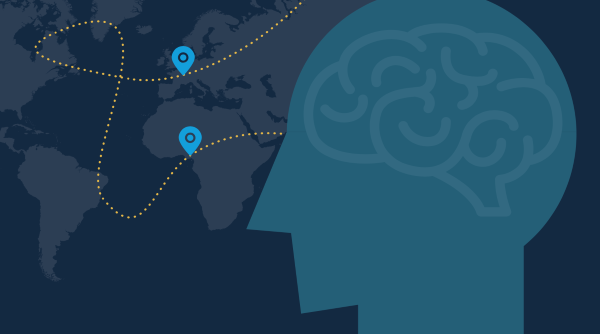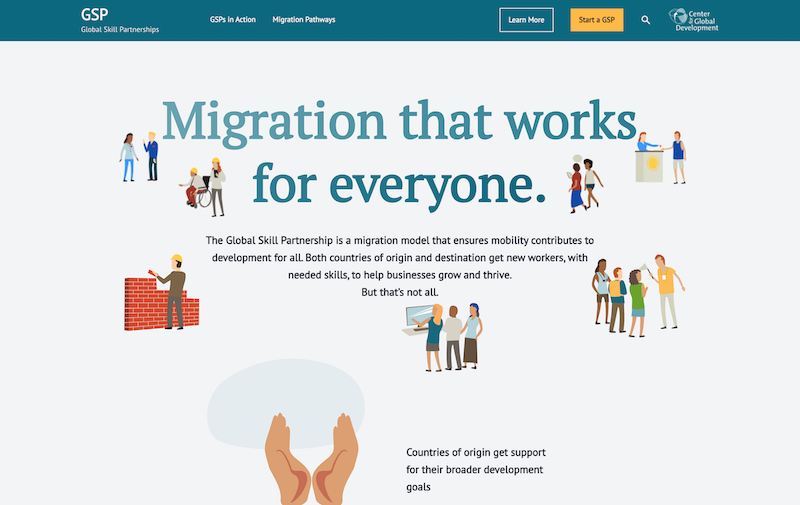Recommended

REPORTS
This blog was originally published on the World Bank “Let’s Talk Development” blog.
The world is currently at a crossroads. Today, there are roughly the same number of working-age people in both Europe and Sub-Saharan Africa. Yet by 2050, the picture will look very different. Europe’s working-age population will have declined by 15 percent, while Sub-Saharan Africa’s will have increased by over 130 percent.
This is an opportunity to be harnessed. Young people in Sub-Saharan African countries such as Nigeria are increasingly educated and skilled. Yet they are often unable to find meaningful work within their countries of origin, either because their skills are not well aligned to the needs of employers or because there is an absolute lack of roles available. This is creating emigration pressure, with many seeking opportunities both regionally and internationally, leading to fears of “brain drain”.
At the same time, employers throughout Europe are facing significant skill shortages, reducing productivity and investment, and putting pressure on pension systems. They are also struggling to agree on a continent-wide approach to both reduce irregular migration, and increase regular migration, from Sub-Saharan Africa. The recent New Pact on Migration and Asylum has attempted to move this discussion forward, with the proposition of both a new European Union Talent Pool and Talent Partnerships with third countries.
Today, the World Bank and the Center for Global Development (CGD) have published a new report exploring how new mutually beneficial migration partnerships can be built between Nigeria and Europe. In this blog, we outline three roles that multilateral organizations such as the World Bank can play to support such partnerships.
1. Support the collection of data and knowledge on skill shortages
If countries are to build migration partnerships that facilitate training and mobility, they need an in-depth understanding of skills shortages and surpluses throughout a range of industries in the past, present, and future. This data is especially hard to come by in low- and middle-income countries of origin such as Nigeria.
The World Bank can support client countries in collecting, analyzing, and forecasting data on skills shortages faced at home and abroad to highlight where targeted training can help close the skills gap. Without such specific occupation- and area-based information, external partners run the risk of training for skills not required in either countries of origin or destination.
For example, one such data collection opportunity scoped in our report is within the scheme of a health care partnership between Nigeria and the United Kingdom (UK). Available data shows that Nigeria has been suffering from a shortage of nurses in a range of specialisms including Cardiothoracic, Anesthesia, Burns and Plastic, Occupational Health, and Nephrology, while the UK is suffering from a shortage of primary care nurses. Such information is being gathered by Ministries of Health and collated by the World Health Organization (WHO) through their National Health Workforce Accounts, but disaggregation at regional level is still limited. This kind of data collection approaches should be supported, strengthened, and scaled.
2. Build institutional capacity for better migration systems in countries of origin
Reducing the risks and enhancing the benefits from labor migration requires countries of origin to equip potential migrants with skills that are in demand in countries of destination, and to ensure that their migration management systems support this mobility. Most of the World Bank’s support to partner governments in this space is geared towards equipping youth with skills relevant for the domestic labor market. Yet there are emerging examples of support geared towards aligning skills training to international standards and creating pathways to employment.
For example, the Skills and Employment for Tongans (SET) project is a US$18.5 million grant from the World Bank to the Government of Tonga that aims to ensure technical and vocational education and training (TVET) courses are improved to help students build skills to make them more employable, not only in Tonga but also in Australia and New Zealand. Similar support in the form of technical assistance can also be provided to client countries to improve migration management systems, helping negotiate bilateral labor agreements, improving public and private intermediation services, and strengthening migrant worker protection mechanisms, among others.
3. Provide "proof of concept," convening actors and financing new pilots
In the report, we highlight that one of the main reasons why such migration partnerships are few and far between is a failure of coordination. While countries of destination and origin may be interested in developing mutually beneficial migration partnerships, they might want to see a “proof of concept”, or mechanisms put in place to reduce the many risks inherent within such an approach.
The World Bank can play the role of an interlocutor, leveraging its substantial convening power and relationships to facilitate multi-stakeholder dialogue. Such dialogue could help finalize elements of the design and leverage World Bank experience in areas such as transnational recruitment systems, public and private intermediation services, safe migration and workers’ rights, and skills training and recognition.
A final role that the World Bank could play is directly financing and evaluating pilot programs, thereby reducing some of the risk that others may be wary to incur. For example, the World Bank is funding a pilot in Morocco that aims to strengthen the institutional capacity of its public employment agency to enable better preparation and placement of youth both in Morocco and in Germany.
It is important to acknowledge that all of the roles outlined above are difficult to implement in practice and require working across sectoral and geographical barriers. However, the World Bank is one of the best placed global institutions to take on a more substantive role in the international labor mobility discussion because of its knowledge generation potential, deep engagements with countries of origin and destination, and its ability to bring together diverse set of stakeholders into a common forum.
Related reports:
Disclaimer
CGD blog posts reflect the views of the authors, drawing on prior research and experience in their areas of expertise. CGD is a nonpartisan, independent organization and does not take institutional positions.
Image credit for social media/web: International Monetary Fund/Flickr






